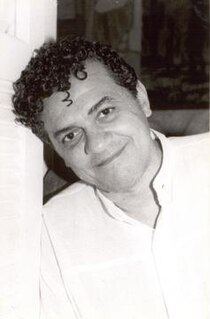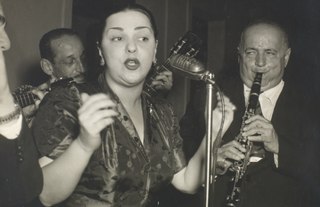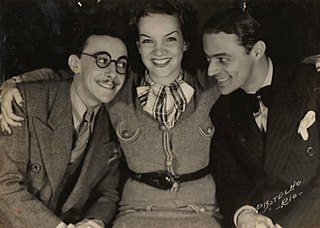Joaquim Silvério de Castro Barbosa | |
|---|---|
 Castro Barbosa, 1961 | |
| Born | 1905 |
| Died | 1975 |
| Occupation | Singer, actor |
Castro Barbosa (1905-1975) was a Brazilian actor and singer. His song, O Teu Cabelo Nao Nega, Mulata!, became a hit in Brazil in 1932. [1]
Joaquim Silvério de Castro Barbosa | |
|---|---|
 Castro Barbosa, 1961 | |
| Born | 1905 |
| Died | 1975 |
| Occupation | Singer, actor |
Castro Barbosa (1905-1975) was a Brazilian actor and singer. His song, O Teu Cabelo Nao Nega, Mulata!, became a hit in Brazil in 1932. [1]

Alfredo da Rocha Viana Filho, known as Pixinguinha was a Brazilian composer, arranger, flautist and saxophonist born in Rio de Janeiro. Pixinguinha is considered one of the greatest Brazilian composers of popular music, particularly within the genre of music known as choro. By integrating the music of the older choro composers of the 19th century with contemporary jazz-like harmonies, Afro-Brazilian rhythms, and sophisticated arrangements, he introduced choro to a new audience and helped to popularize it as a uniquely Brazilian genre. He was also one of the first Brazilian musicians and composers to take advantage of the new professional opportunities offered to musicians by the new technologies of radio broadcasting and studio recording. Pixinguinha composed dozens of choros, including some of the best-known works in the genre such as "Carinhoso", "Glória", "Lamento" and "Um a Zero".
The samba school Imperatriz Leopoldinense was created on March 6, 1956 in the suburb of Ramos, in Rio de Janeiro. It is named after Maria Leopoldina, archduchess of Austria and Empress of Brazil, consort of Emperor Pedro I.

Carlos Alberto Ferreira Braga, commonly known as Braguinha or João de Barro, was a Brazilian songwriter and occasional singer.

Marília Soares Pêra was a Brazilian actress, singer, and stage director. Hailed as "one of the decade's [1980s] ten best actresses" by Pauline Kael, Pêra won the National Society of Film Critics Award for Best Actress in 1982 for her role in Hector Babenco's acclaimed Pixote, and received Best Actress awards at the Gramado Film Festival and at the Cartagena Film Festival for Carlos Diegues' Better Days Ahead. Other films include Bar Esperança, Angels of the Night, and Diegues' Tieta do Agreste.

Elizeth Moreira Cardoso, was a singer and actress of great renown in Brazil.

Taiguara Chalar da Silva, whose stage name was Taiguara, was a Brazilian singer and songwriter.

Karina Bacchi is a Brazilian actress, model and television presenter, best known for being the winner of the first season of the Brazilian version of Dancing with the Stars and the winner of the second season of the Brazilian version of The Farm.

Linda Batista, born Florinda Grandino de Oliveira was a Brazilian popular musician.

José Abelardo Barbosa de Medeiros, better known as Chacrinha, was a Brazilian comedian, radio and TV personality. His career was at its peak from 1950 to 1980. He was author of a famous Brazilian phrase that states: "Na televisão, nada se cria, tudo se copia". In his shows, now famous Brazilian celebrities were revealed, such as Roberto Carlos and Raul Seixas.

The Best Samba... Ever! is a compilation album released by EMI in 2006.

Wilson Simonal de Castro, was a Brazilian singer, born in Rio de Janeiro on February 23, 1938. He died in São Paulo on June 25, 2000. He was a singer with great success in the 1960s and in the first half of the 1970s. He was married two times and had two sons: Wilson Simoninha and Max de Castro, both are artists today. He also had a daughter, named Patricia.
Sucessos Inesquecíveis de Elis Regina is a five-disc CD-set of songs performed by Brazilian singer Elis Regina, including compositions by Milton Nascimento, Gilberto Gil, Rita Lee, Tom Jobim, Belchior, João Bosco, Ary Barroso, Ivan Lins, and Carlos Lyra. The choice of songs was based on recommendations by some 8,000 subscribers of the magazine "Seleções" and numerous musicians. Each disc follows a certain theme as indicated by the title for each.

Cangaia de Jegue is a Brazilian band from Jequié, southwest Bahia, Brazil. It has released albums Cangaia de Jegue (2004) and Você vai ver (2006) and a live album Cangaia de Jegue – Ao Vivo) in 2009. The band is very popular in Bahia state which is its base. The greatest claim to fame of Banda Cangaia de Jegue is their hit "Ai se eu te pego!". The song appears also in their promotional CD album of same title Ai se eu te pego!. The song co-written by Sharon Acioly and Antônio Dyggs, became a later massive Brazilian and international hit by Brazilian singer Michel Teló with slightly amended lyrics.

Banana da Terra is a 1939 Brazilian musical film directed by Ruy Costa and written by Braguinha and Mário Lago. The film stars Carmen Miranda, Dircinha Batista and Aloysio de Oliveira. It was Miranda's last film in Brazil, before she moved to Hollywood.

Estudantes is a Brazilian musical comedy film directed by Wallace Downey and starring Carmen Miranda, Barbosa Júnior, Mesquitinha and Mário Reis.

Elvira Olivieri Cozzolino, better known by her stage name Elvira Pagã, was a Brazilian vedette and actress, singer, writer and painter. She was the first Rio Carnival Queen, the first woman to wear a bikini in public, and one of the first women to have cosmetic surgery in Brazil. Talented and controversial, she broke the status quo and faced the reigning "machismo" with fearless audacity during the Brazilian military dictatorship and the revolutionary 1960s, where she lived with determination and courage. Pagã retired from public life, wrote and painted in her later years, dying a recluse.

Cauby Peixoto was a Brazilian singer, whose career lasted from the late 1940s until his death in 2016. He is known for his deep voice and extravagant mannerisms and hairstyles. He had a brief career in the United States in the 1950s, where he presented under the pseudonyms Ron Coby or Coby Dijon.

Marina Souza Ruy Barbosa is a Brazilian actress. She started off her career as a child actress; her first major role was in the telenovela Começar de Novo. In 2006, she portrayed a prominent character in Silvio de Abreu's Belíssima. She later appeared in Sete Pecados (2007), Escrito nas Estrelas (2010), Morde & Assopra (2011), and Amor à Vida, interpreting Nicole, a young orphan and millionaire who gets cancer, Hodgkin's lymphoma type 4.
Aline Dias Pacheco is a Brazilian actress and model.

Filipe Catto Alves is a Brazilian singer, instrumentalist, composer, illustrator and designer. He has worked with genres such as MPB, samba, tango, jazz, rock and bolero.
"O Teu Cabelo Nao Nega, Mulata" ["Your Hair Does Not Deny It, Mulata"] is one of the most famous carnival hits of all time. It is a marcha, a close relative of samba, and the mainstay of carnival in the era. [...] The marcha was first recorded in December, 1931, by the singer Castro Barbosa, and became the hit of the 1932s Carnival.